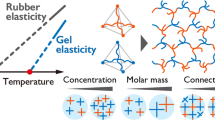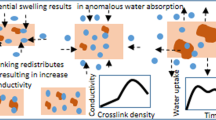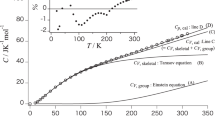Abstract
POLYMERIC gel systems may be formed either by cooling a polymer solution, or by swelling a suspension of solid polymer particles in a suitable solvent. These two types of gelation process differ in one fundamental respect. Gel formation from solution is usually a thermoreversible process, and on warming, the system reverts back to a solution. On the other hand, gelation by swelling is thermally irreversible, and scarcely any shrinkage occurs on cooling.
This is a preview of subscription content, access via your institution
Access options
Subscribe to this journal
Receive 51 print issues and online access
$199.00 per year
only $3.90 per issue
Buy this article
- Purchase on Springer Link
- Instant access to full article PDF
Prices may be subject to local taxes which are calculated during checkout
Similar content being viewed by others
References
Greenberg, D. M., and Mackey, M. A., J. Gen. Physiol., 15, 161 (1931).
Laing, M. E., and McBain, J. W., J. Chem. Soc., 115, 1279 (1919).
Collison, R., and McDonald, M. P., Nature, 186, 548 (1960).
Sandstedt, R. N., Cereal Chem., 32, Supp. (1955).
Collison, R., Campbell, J. D., and Elton, G. A. H., Chem. and Indust., 1230 (1960).
Author information
Authors and Affiliations
Rights and permissions
About this article
Cite this article
COLLISON, R. Ionic Conductances in Gels of Wheat Starch. Nature 188, 1105–1106 (1960). https://doi.org/10.1038/1881105a0
Issue Date:
DOI: https://doi.org/10.1038/1881105a0
Comments
By submitting a comment you agree to abide by our Terms and Community Guidelines. If you find something abusive or that does not comply with our terms or guidelines please flag it as inappropriate.



